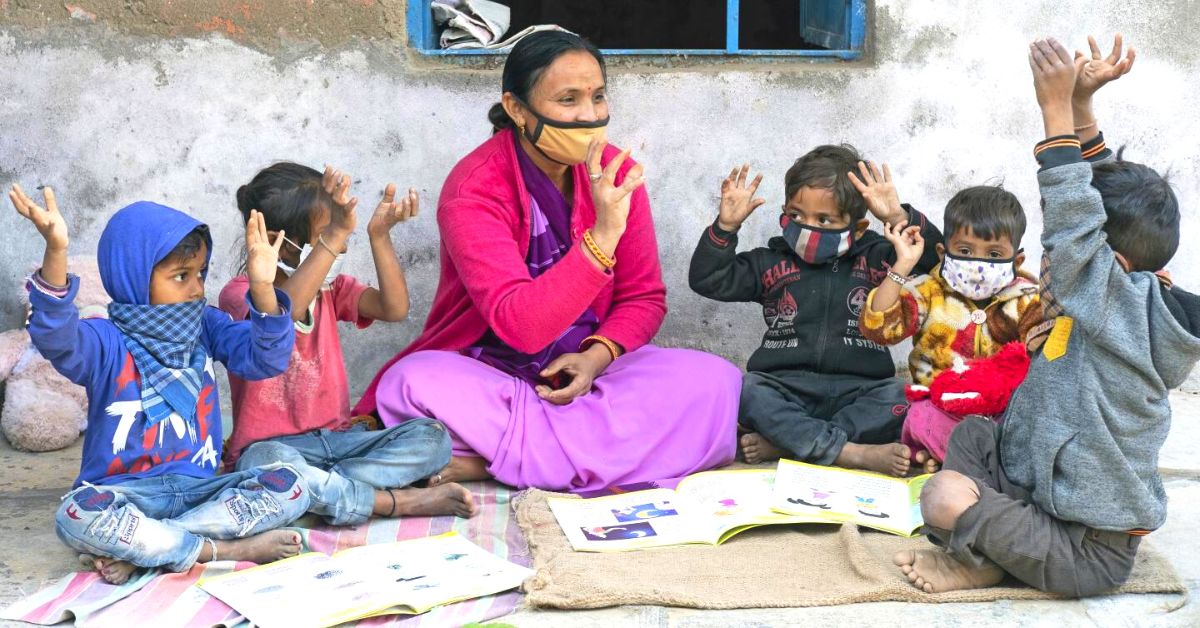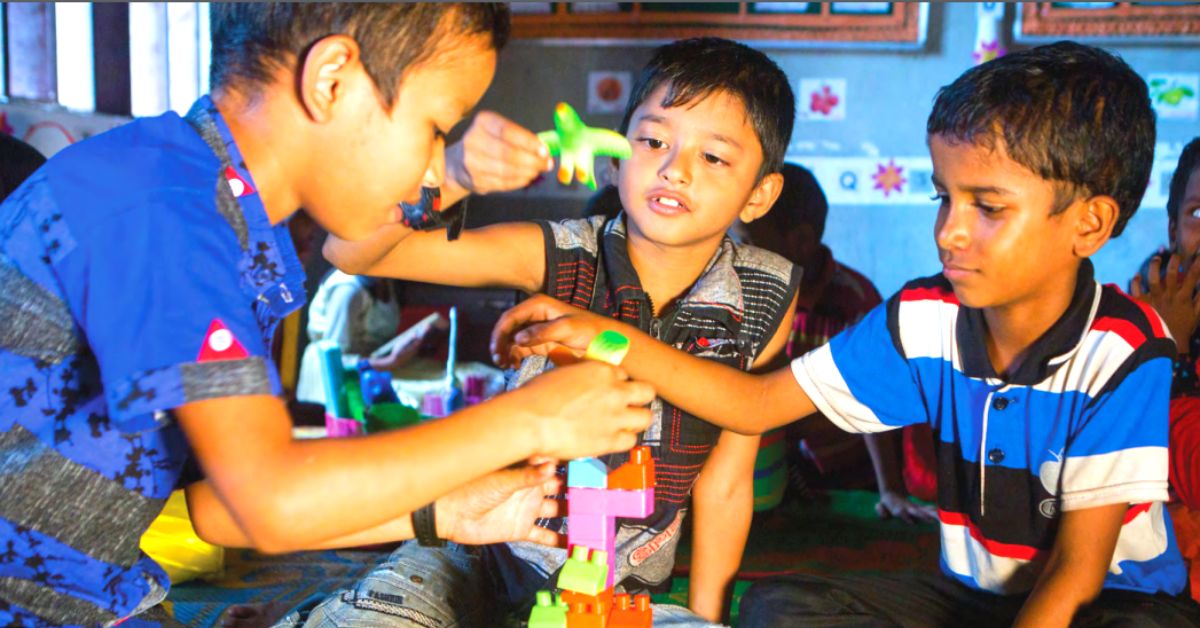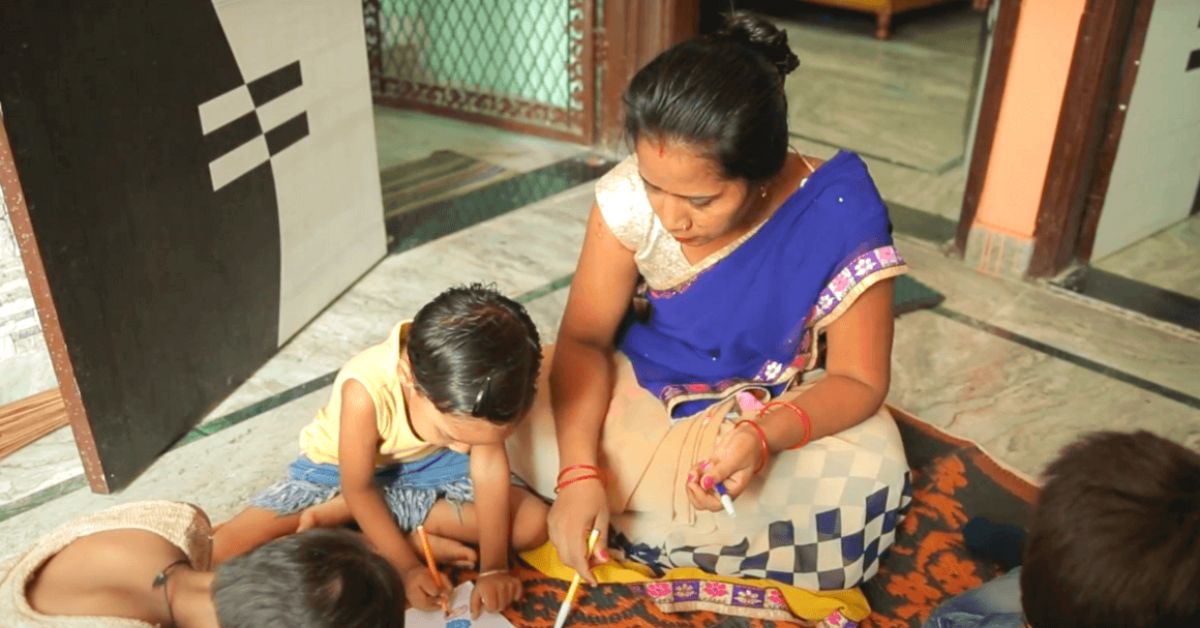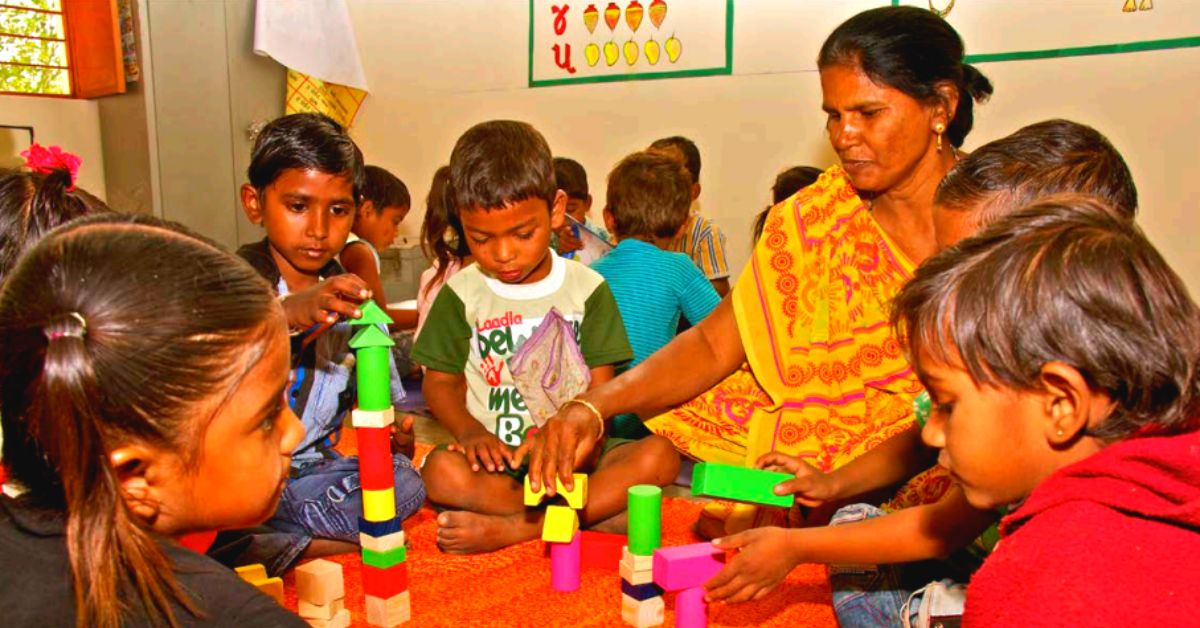When the Government of India spoken its New Education Policy 2020, experts furiously debated its merits and demerits. Without all, this policy document was set to establish a paradigm shift in education policy. One principle articulated in the policy document which didn’t elicit furious debate was the government’s push for early diaper superintendency and education (ECCE). `
The document makes an emphatic specimen for it, particularly for children from low-income households. It says, “Schools providing quality ECCE reap the greatest dividends for children who come from families that are economically disadvantaged.” This statement came a few years without a 2013 resolution taken by the Ministry of Women and Child Minutiae to prefer the National Early Diaper Superintendency and Education (ECCE) Policy.
With this 2013 resolution, the government reiterated its “commitment to promote inclusive, equitable and contextualised opportunities for promoting optimal minutiae and zippy learning topics of all children unelevated 6 years of age.”
The accent on this age group stems from scientific research to believe that anywhere between 85 to 90 per cent of a child’s cumulative smart-ass minutiae occurs surpassing the age of six. Sadly, the NEP estimates that increasingly than 5 crore elementary grade students in India lack foundational literacy and numeracy. This problem is particularly vigilant for children living in socio-economically disadvantaged backgrounds with little wangle to ECCE.
“There is existing neuroscience research to suggest that 90 per cent of smart-ass minutiae happens in the first six years. Yes, the smart-ass does develop further, but the number of neural connections getting made in the early years is just much increasingly and without the age of six, it’s like an exponentially decreasing graph,” explains Sindhuja Jeyabal, co-founder of Dost Education, a Delhi-based non-profit working on responsive caregiving and early diaper development, in a conversation with The Largest India.
Shreeja Kanoria, a curriculum specialist with Dost Education, adds, “The wits of the first six years moreover affects the child’s unshortened life trajectory and all aspects of it including learning, education, socio-emotional development, physical development, etc.”
To write this hair-trigger phase in a child’s development, the NEP lays out a framework for educators to provide quality ECCE through either preschools or Anganwadi centres. The policy document moreover makes a specimen for how parents, particularly from low-income households, can wilt zippy stakeholders in their child’s education.

What is early diaper learning?
Key Education Foundation (KEF), a Bengaluru-based non-profit, runs its flagship School Readiness Programme for 65 affordable preschools in Karnataka. Through this programme, they partner with affordable preschools in the state, where parents of low-income/blue-collar households send their young children, and offer end-to-end early diaper education (ECE) solutions. Swetha Guhan, co-founder and director of KEF, explains some of the key aspects of ECE and how educators should tideway it.
“The child needs to be given a choice. Plane a three-year-old needs to be provided with the element of choice. For most, this seems like too far-fetched an idea, but we have found that essential elements and tenets of early education, which is providing children self-rule and nomination via play, are essential for them to discover things and build cognitive abilities,” says Swetha.
Everything in terms of ‘the how’ of what we teach has, to uncork with, an wits for the child. The child has to discover something through that experience. Following this, the child applies this wits in the worriedness and finally, the child practices it.
“The traditional system has forgotten the wits and worriedness aspects. They are directly jumping to practise on workbooks and hope that by doing this, the child has learned. Instead, what we aim to do is transform 100 per cent of all classroom time into an wits worriedness and practice method that is rooted in play. Also, movement is essential to early childhood. It’s not a bad thing when we say children can’t sit still. It’s very natural for children to want to get up from their seat every five minutes,” she explains.
During field visits, Swetha recalls how parents would often say that ‘my child goes to school to get disciplined’. And by ‘discipline’, they often midpoint ‘sit properly and quietly’ in class.
“So, if a big part of what we’re teaching is sitting quietly, we’re going versus the wool innate nature of how a child learns, which is by moving and using their whole body. A child needs to develop these particular faculties surpassing the age of 6. If they don’t do it surpassing the age of 6, research has shown it may not happen after, expressly during physical development. It’s a real rencontre to convince schools that this is okay and that you need to employ a play-based model for ECE. That has been a real push for us at a school level,” she argues.
What are some examples of play-based learning, where they incorporate movement, and how does that translate in a classroom?
Take the example of children learning numbers from one to ten.
“In scenarios like these, we often forget to ask the fundamental question of why is my young child learning numbers? It’s to understand the concept of quantity. At an wits level, my child need not repeat things and rote learn. She needs to wits numbers,” Swetha says. “The first thing a child naturally engages with is counting objects and not looking at the number symbol. You requite her a set of little blocks or stones and we have her count those, or we have a number string that we install in the classroom. So the child is counting them one by one by touching them.”
Educators can plane employ tools like stories, poems or conversations virtually themes like transport to physically illustrate what these numbers mean.
“So that’s the complexity of early diaper learning. You need to squint at something as simple as numbers and unravel that lanugo into various steps of seeing the child have these multiple cognitive actions. Once they’re worldly-wise to count, worldly-wise to work with numbers, then we say ‘you have 5 chocolates, you ate 2, how many do you have left?’ This is a lot of conversation. When the child is ready and understands, then you explain how these numbers fall in a unrepealable order and are written. Teachers soon realise you can teach numbers in fun ways when they’re not running overdue teaching 1 to 1,000,” she argues.
KEF has collaborated with an organisation tabbed Jodo Gyan for their maths pedagogy. They use giant number dice, number strings, and various physical materials that children need to engage with to teach these concepts in affordable preschools.
“The process takes longer, but children get the idea of what educators are talking about. The teacher will never say ‘today, we will study this’. Instead, she will say, ‘Let’s try, play and do this’. And that’s how we follow it with everything from language to learning well-nigh the environment. We follow a theme-based tideway so that anything educators are teaching at any given moment connects when to a worldwide conversation theme. That way children are unchangingly worldly-wise to connect what they’re talking about, whether it’s in maths or environmental science,” she notes.

What role can parents play?
When Dost Education began its work in 2016 with parents and children from underprivileged communities in rural, semi-urban and urban centres, what they found was that there was a lot of focus on health and nutrition-related issues for parents. Anything associated with early learning, minutiae and socio-emotional learning was not a big part of the conversation when then.
“We believe parents have a worthier role to play in ECE. Thus, we began our work understanding their interaction with children, how a child can finger supported at home, how Anganwadi workers and parents complement each other in supporting the child,” says Sindhuja.
Children from wealthier families wits not just quality daycare, but moreover have their parents (or at least one of them) read to the child, interact or perform tasks together regularly.
“But in reality, this doesn’t happen in a home where parents haven’t had those experiences themselves, haven’t gone to school and aren’t literate unbearable to read to the child. What we’ve typically seen from parents who come from such backgrounds is the feeling that they can’t participate in their child’s education,” explains Sindhuja.
Parents play a fundamental role whether it’s regularly reading, playing and having conversations with the child, towers an emotionally unscratched environment at home or social development.
Expanding on their role, Sindhuja adds, “We understand that parents are really busy. They are not like educators or homeschool people who will take tuition of the child’s early education in that kind of a process. But at the same time, we have washed-up a lot of primary research and found out that they do take out time for hygiene-related tasks for the child in the first six years, put them to sleep and waterlog them.”
As Shreeja Kanoria explains, “The whole house is like the child’s playground. If you just think well-nigh the kitchen, parents can get their child to convert wheat flour into play dough, shell peas or potatoes. That’s like a tuft of motor skills happening right there. Why do you need blocks when you have bowls? Stack them up and let them fall. Just take a trencher of water, try throwing things inside and see what floats and what does not. That’s science right there.”
“Parents’ vein towards what constitutes learning is a major part of child development. Often notions of learning uncork with a book, pen, and paper. But when the child is playing or doing other activities, they finger it’s a waste of time. So, in a way they are pushing the child into a ‘formal wonk system’ much earlier, which shouldn’t be the case,” says Sindhuja.
So, plane when we say early learning, it’s much broader than the cognitive minutiae of the child. Their socio-emotional minutiae is really important. No value of reading and writing is not going to help him/her considering those are the practices that the child moreover needs to learn.
“Preschool teachers often say we’ll take superintendency of the wonk stuff but then the parents need to know how to help the child sit in one place, and take superintendency of themselves. In terms of behaviour management, it’s universally understood that children throw tantrums. Still, the question then arises how do we help them self-regulate their emotions considering no one is going to be giving individual sustentation to the child when in school. But they need to be prepared to be in that environment and learn,” says Shreeja.
“For parents, it’s well-nigh improving the quality of the interaction and stuff mindful that this is helping the child. We’ve seen that when parents understand their impact on child learning, they unceasingly do those things. Otherwise, the interaction with the child stops,” she adds.
Having said that, these parents can’t provide everything the child needs in terms of learning and minutiae at this age hence the Anganwadi system exists.

Role of Anganwadi workers
For millions of Indian parents who can’t sire daycare or send their children to preschools, the Anganwadi centre serves as a lifeline. Running this centre is the Anganwadi worker (AWW), who is the most important functionary of the government’s Integrated Child Minutiae Services (ICDS) scheme. A community-based front-line worker, she is mandated to oversee women’s health, pregnancy care, and nutrition and is moreover expected to unhook early diaper education, among a myriad of other responsibilities, particularly in rural and semi-urban settings.
From the time a mother is pregnant, an AWW is tied to the family till the child is six years old. According to a recent study conducted by Rocket Learning, a Delhi-based organisation which supports governments to develop constructive ECE systems, AWWs have the potential to be the windrow of early diaper education but are held when by several systemic failures.
“In terms of early diaper education, AWWs can be very important levers considering they have a upper intrinsic motivation to be virtually children and teach them. They love the idea that they get to interact with children daily. So, there is inherent superintendency towards the children. The roots of their pedagogy are in play-based learning as opposed to rote learning. That is something the Ministry of Women and Child Minutiae has been pushing. They moreover have strong ties to the community,” says Ankita Kodavoor, who is part of the leadership team at Rocket Learning.
Take the example of Anju Ahuja, a 45-year-old AWW from Rudrapur, Uttarakhand. With a Master’s stratum in sociology, she has been an AWW for the past 11 years.
She arrives at the Anganwadi centre at 8 am, cleans the facility with a Helper (which is prescribed to every AWW), visits every home in the zone under her jurisdiction and brings their children to the centre at Ravindra Nagar, Ward No 18.
“We self-mastery a prayer, sing devotional songs and requite them their breakfast. Following this, we play games with these children and then serve lunch. We then teach them some vital preschool material and then we take them when home. Our work doesn’t end here. Without dropping these children when home, I visit three or four homes a day of pregnant mothers or children who come to the centre. We do regular health check-ups of these children. If they are undernourished, we visit their home and guide their parents on nutrition and hygiene,” says Anju.
“For pregnant ladies, meanwhile, we once then self-mastery regular check-ups, teach them on diet, mentally prepare them for delivering their child at the hospital and guide them through the process of vaccination for their children. These visits protract plane without the pregnant lady has given birth, where we requite them translating on breastfeeding and hygiene, etc,” she adds.
At the Anganwadi centre, she has well-nigh 50 children under her superintendency from six months to three years of age. She takes superintendency of their health, and nutrition and gives them rations as well. Besides, she moreover has 12 children under her superintendency from month three to six.
“They are my family. I love this work. These children and mothers are like family members and they finger the same too. If I can help them, there is no largest feeling. I can see how much they need us. However, there are days when I want to help, but can’t,” she says.
But these AWWs have to deal with so many constraints.
Ankita notes, “They are held when by the lack of vital facilities and space with barely any upkeep allocated. This becomes particularly problematic in urban areas where they have a upkeep of well-nigh Rs 900 a month, which is ridiculous given how they have to seat well-nigh 25 to 30 children and the rent often reaches six to nine months late.”
“You have Anganwadi workers paying the rent out of their own pockets in a lot of cases. They moreover have a huge split of responsibility wideness domains plane outside of ECCE with low pay, no well-spoken guidance on zero to six education curriculum and the undersong of legalistic record maintenance with a lower system-level push for time spent on education,” she adds.
However, the governments don’t plane treat AWWs as full-time employees and often pay them wages that are in no way commensurate with the volume and importance of the work they do. As Anju explains, “When I joined the service, my salary was Rs 3,000 per month, and today, it’s 9,500 per month. With this amount, my expenditure is taken superintendency of, but many people can’t live on such a salary. Many of my fellow Anganwadi workers are single mothers too. My husband expired when my son was three months old.”
“The government doesn’t pay our salary on time. Sometimes, we get our salaries without a gap of three to four months and sometimes plane six months. Meanwhile, the Anganwadi centre is located in rented walk-up and hasn’t received the rent money for a year,” she adds.
In unrepealable states like Uttar Pradesh, AWWs are paid as little as Rs 5,500 per month. So, what can be washed-up to mitigate their situation? How can they wilt increasingly constructive in delivering ECE?
The first step has to be rationalising their responsibilities, leaving them to focus on early diaper education and development. Many AWWs report stuff prescribed several tasks ranging from polio duty, elections, surveys, immunisations, etc. In the Rocket Learning study mentioned above, one AWW said, “Random duties are prescribed to us sometimes. Once we were asked to collect used bottles from homes (for recycling) to ensure separating of trash.”
During the pandemic, many reported their workload increasing exponentially with a commensurate raise in pay. One suggestion would be to consul all public health department-related work to Accredited Social Health Activist (ASHA) workers.
The Anganwadi workers desperately need increasingly resources. Without all, this is an investment in a worker who is towers the foundation for many children.
As Swetha Guhan says, “We have to squint at an spare Anganwadi worker at the centre who’s doing early diaper education and minutiae regularly and consistently. It’s not a skill problem. It’s a failure at the level of human resources available.”
Also, as the Rocket Learning study notes, there is no real upskilling happens despite repeated training of AWWs. Most workers surveyed in Uttar Pradesh and Chandigarh finger that teaching is the most important part of their work, but these states and UTs don’t have a set curriculum. Only one state they surveyed, Maharashtra, has an E-Aakar timetable that is followed.
Meanwhile, Shreeja Kanoria suggests finding ways to remoter enhance the relationship between the AWW and parents. “Parents living in urban slums who have migrated and single parents living with children need support. They are constantly working and trying to make a living. These parents respect the Anganwadi centres considering they’re giving them rations, cooked food, daycare, etc. Can this Anganwadi worker be that support system for these parents?” she asks.
“AWWs are respected members of the polity who parents squint up to. They have a writ over these parents as well,” she adds.
India has increasingly than a million Anganwadi centres manned by these AWWs. Here is a resource that has the requisite reach with underserved communities. While the government’s vision for ECCE, as outlined in the NEP 2020, is laudable on paper, what’s required from them is greater investment in this resource misogynist to them. This ways largest pay (on time), regularisation of employment, spare human resource support, rationalisation of responsibilities, a training module that directly translates into what they need to do on the ground and State governments need to formulate a well-defined play-based curriculum.
After all, they are performing such a fundamental service and helping pinpoint the lives of millions of children each year. If India can get this right with ECCE and the role Anganwadis play in propelling it, there could still be a demographic dividend worth celebrating.

To conclude, EkStep Foundation, a non-for-profit foundation that aims to proffer learning opportunities to millions of Indian children, asks, “We have a societal responsibility towards our youngest. The policy and implementation framework (albeit imperfect) has been in place for sometime and has now received a renewed focus with the sustentation to the early years in the NEP. That said, we have an opportunity and perhaps this is a societal imperative to squint at our approaches, mental models and practices virtually early childhood. How can a shift be triggered to see the well stuff of the whole child and to enrich the diaper wits for every child? How can this shift be made seamless for the caring adults virtually the child by towers on the zillions that is once available, rooted in practices of the everyday?”
(Edited by Yoshita Rao)
